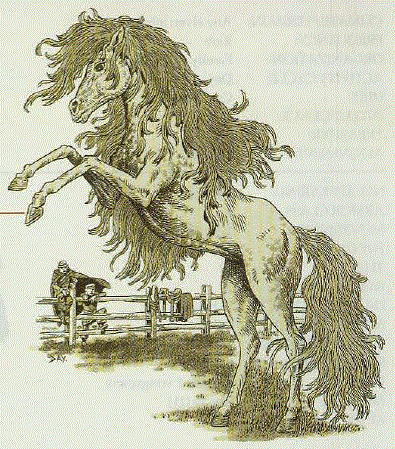
| Riding Horse | War Horse | |
|---|---|---|
| Climate/Terrain: | Elven inhabited | Elven inhabited |
| Frequency: | Very rare | Very rare |
| Organization: | Herd | Herd |
| Activity Cycle: | Day | Day |
| Diet: | Herbivore | Herbivore |
| Intelligence: | Low to average (5-10) | Low to average (5-10) |
| Treasure: | Nil | Nil |
| Alignment: | Neutral | Neutral |
| No. Appearing: | Variable | Variable |
| Armor Class: | 6 | 6 |
| Movement: | 30 | 24 |
| Hit Dice: | 2 | 3+3 |
| THAC0: | 19 | 17 |
| No. of Attacks: | 2 | 2 |
| Damage/Attack: | 1-2/1-2 | 1-4/1-4 |
| Special Attacks: | Nil | Nil |
| Special Defenses: | Beauty | Beauty |
| Magic Resistance: | 10% | 15% |
| Size: | L | L |
| Morale: | Steady (12) | Elite (14) |
| XP Value: | 120 | 270 |
Raised by gray elves for millennia, this particular breed of horse has been brought to what many feel is the pinnacle of grace, elegance, and speed. The gray elves call this animal yyllethyn, which means "sun follower."
Elven horses are most often white, though some lines are dapple gray, golden, or rarely black. With the exception of the dapple gray, these colors are always uniform, without the common socks, stars, or blazes that mark mundane horses. The elven horse is also slightly longer in the leg, neck and nose than its common cousin, giving it an a lmost delicate appearance. Its mane and tail are long and £lowing, and its hooves are a pale, silvery pink Their eyes are invariably blue-green.
The elven horse can move through grassland or forest as silently as an el£, even when encumbered by a rider, though any saddle, reins, or barding must be muffled or removed to avoid incidental noise.
Because of their refined bloodlines, elven horses are much more intelligent and more easily trained than other horses. They respond to commands not so much out of training as from personal choice. Rarely is such a horse given to a non-elf, and they would never be sold, nor could they be stolen. The horse-thief would find the animal hostile and aggres:,ive, ready to bolt back to its owners at the first opportunity. 1£ captured and unable to escape, an elven horse sickens and dies within a week.
Combat: The elven warhorse, like the common warhorse, continues to fight independently of its rider. It attacks with its front hooves and fights even if its owner is killed or incapacitated.
Elven horses do not panic at loud noises or fire as easily as mundane horses. Elven riding horses panic only 40% of the time. Elven warhorses do not panic in any circumstances.
Elven horses have also been bred to have a slight resistance to magic. Elven riding horses have a 10% resistance to magic, whereas the elven warhorse has a 15% resistance.
Their extreme, almost ethereal beauty makes it difficult for an intelligent opponent to attack the elven horse. Any opponent of semi- or higher lntelligence must make a saving throw vs. spell when deciding to attack an elven horse. FaiJure means the opponent just can't muster the wickedness to injure such a beautiful animal. If the elven horse causes any damage to the opponent, however, the charm is broken.
Habitat/Society: Elven horses are longer lived than their mundane relatives. The average pregnancy for an elven mare lasts 13 months, after which a single foal is born. The foal is weaned after 8 months and matures after 5-6 years. The typical life span of the elven horse is anywhere from 60 to 90 years, though some have been rumored to be immortal.
Elven horses form small family groups rather than herds. They mate for life and become melancholy if taken away from theLr mates. Although they have no language of their own, elven horses understand the languages around which they were raised. These bloodlines are usually bred for elven royalty, their ancestors having served as mounts for some of the most famous elven heroes.
Ecology: Elven horses have been bred from common horse stock over countless eons. They have since become a separate species and cannot interbreed with common horses. They do not exist in the wild and are never used as beasts of burden, other than as mounts or war steeds. They are most commonly found in gray elf communities, though some high elf communities boast the occasional herd, and there have been rnmors of a sylvan breed.
